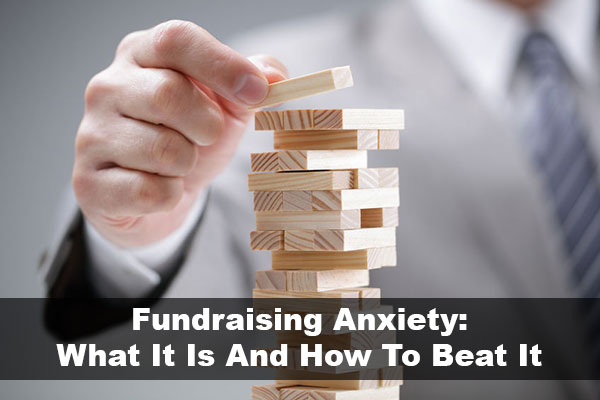Fundraising anxiety affects nearly all nonprofits. Not meeting your fundraising goals translates to staff and programs being cut. Your colleagues may be out of a job, and critical social services are diminished, affecting people and communities in need.
While similar to burnout, fundraising anxiety is different. Burnout usually results from nonprofit workers being underpaid and overworked. It is a plague for nearly all nonprofits, who see very high turnover and end up wasting precious funds on re-training new staff continuously. (Read: 17 Mistakes Fundraisers Can Stop Making Now)
Fundraising anxiety is different than burnout in 4 key ways:
1. Uncontrollable Targets Create Fundraising Anxiety
Fundraisers base their sense of success on uncontrollable targets. While we do our best to ‘qualify’ prospects, ‘cultivate’ new donors, and ‘retain’ current donors, we cannot control who gives and who does not.
More often than not the decisions to give or to pass on a proposal request are personal to the donor, or aligned with external factors. Constantly shifting priorities in global and local needs, amount of funding available to donate, and changing tax laws are all part of the myriad of donor decision making.
Other program staff, and even executive directors who help with the fundraising team, have much more tangible targets (teaching a certain number of classes, creating new partnerships, etc.). Anxiety comes from the lack of control, which makes us, as humans, generate a stress reaction.
2. Overwhelming Responsibility Can Lead to Fundraising Anxiety
Fundraisers feel responsible. More often than not, the fundraiser is the scapegoat for not meeting goals. This is a professional concern that is real – you could lose your job if you fail to raise money.
There is also a real and difficult to define personal responsibility that fundraisers have. Programs and services that could help millions of poor people or other mission-driven goals depend on successful grants and donations. Feeling responsible for those programs happening, or not happening, is a huge burden.
3. Hard External Deadlines Turn Fundraisers into the Hulk
Fundraisers are faced with hard external deadlines. Grant deadlines are extremely stressful, and even cause our brain to rewire. A Psychology Today article relates it to turning into the Hulk. Emotions charge and result in crazy highs and lows that cause depression and anxiety.
4. Working Alone Creates Fundraising Anxiety
Fundraisers are often alone. More often than not, we have the smallest team or work alone within the nonprofit structure. Everyone else is helping out with program work. Fundraisers hence deal with all that responsibility and anxiety by themselves, which makes it even stronger.
Also read: 6 Tips To Apply Positive Persistence To Get Your Donation
Some best practices can help fundraisers avoid anxiety (or lessen it):
1. Beat Your Deadlines
Do not wait until the last minute! Always set a goal to submit a grant at least 3 days in advance. Avoid becoming the Hulk.
2. Be Realistic
Set achievable goals. Every good fundraising plan should work in the fact that donors are uncontrollable. You are not going to get every grant, nor retain every donor.
Also, you only have so much time. Say no to new grant opportunities if you are overwhelmed!
3. Insist on Performance Review Goals
Redefine what ‘success’ is. All you can do as a fundraiser is plan, match as many prospects to the cause as possible, and serve as a communication conduit to connect prospects to the cause. Basing performance on amount raised is a terrible idea that will give you anxiety.
4. Strict Quitting Times
Work no more than 8-10 hours a day and quit. Research time and time again shows that people cannot work more than 55 hours a week, that productivity declines tremendously. Never work at home, and shut off the computer at a set hour. If you work at a home office, make sure the space is completely separate. Lock it at a set hour.
5. Disconnect and Promote Self-Care
When you are not in the office, turn off your cell phone and disconnect entirely. Self care is extremely important! It means more than practicing yoga and going for a run (which help and are recommended).
It means taking care of your family first. Going to bed early. Taking time to see the dentist. If you make yourself and your family the priority, your work is less worrisome.
Also read: Why Fundraising Is Important
6. Plan Ahead
Create a year long fundraising calendar, and work out in advance when you need more resources and support. This way you will not end up having 4 big grants due in the middle of your annual gala!
7. Stay Flexible and Diversify
While planning can indeed help reduce anxiety, inflexible plans can also cause it. Donors come and go, and you need to stay flexible for new opportunities. This also means you should not put too much emphasis on any one strategy.
8. Create a Team
The best way to reduce anxiety from working alone is to create a team! Here’s a step by step check list on how to put together a fundraising committee.
9. Join a Peer Network
Reach out to others! Join a peer network, like the Association for Fundraising Professionals, to take seminars and go to conferences with like-minded people.
If you work consistently to manage the anxiety triggers, you can make fundraising fun instead of anxiety-ridden!
What steps are you taking to fight or lessen anxiety? Please share your tips with us in the comments below!

